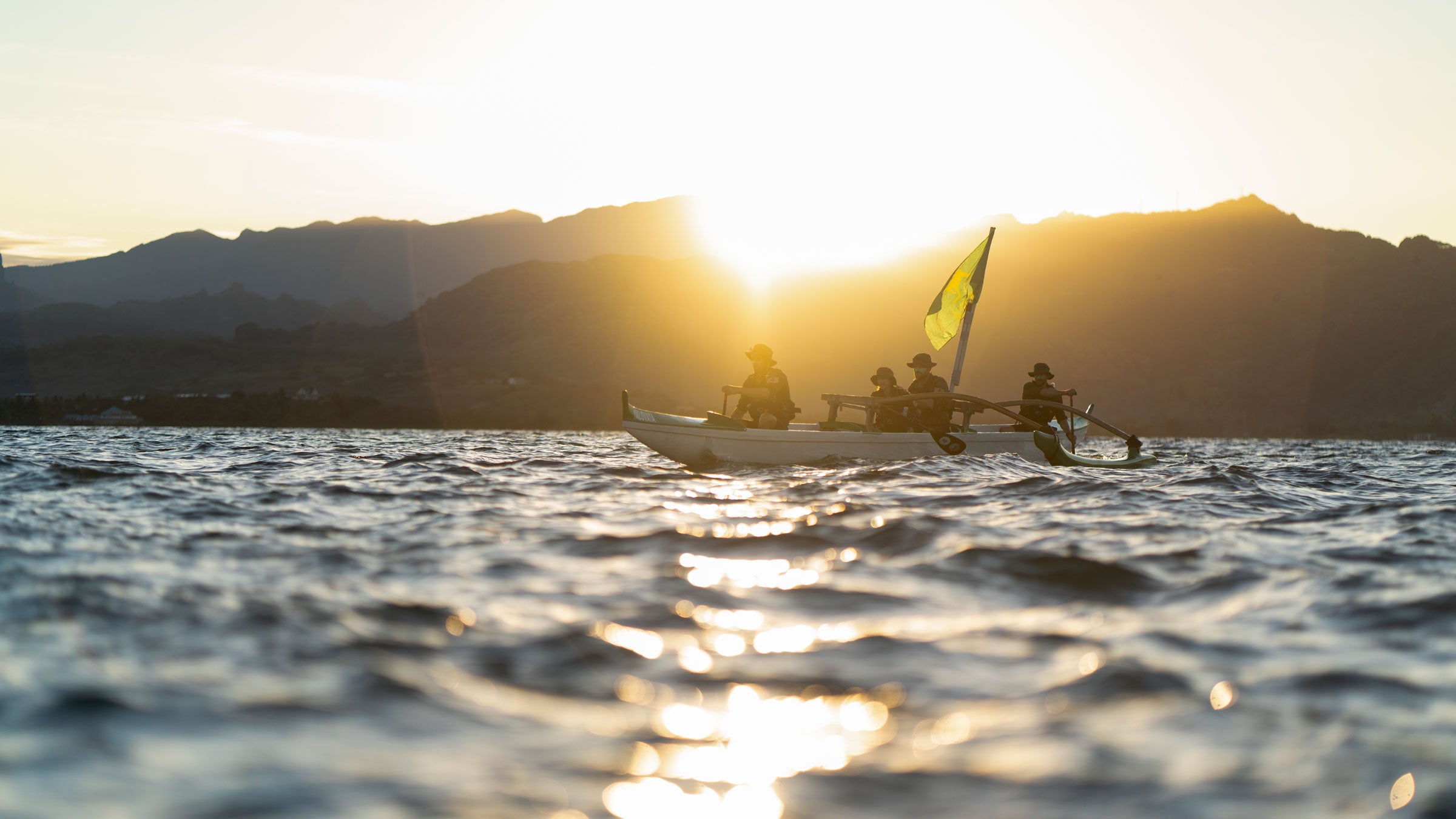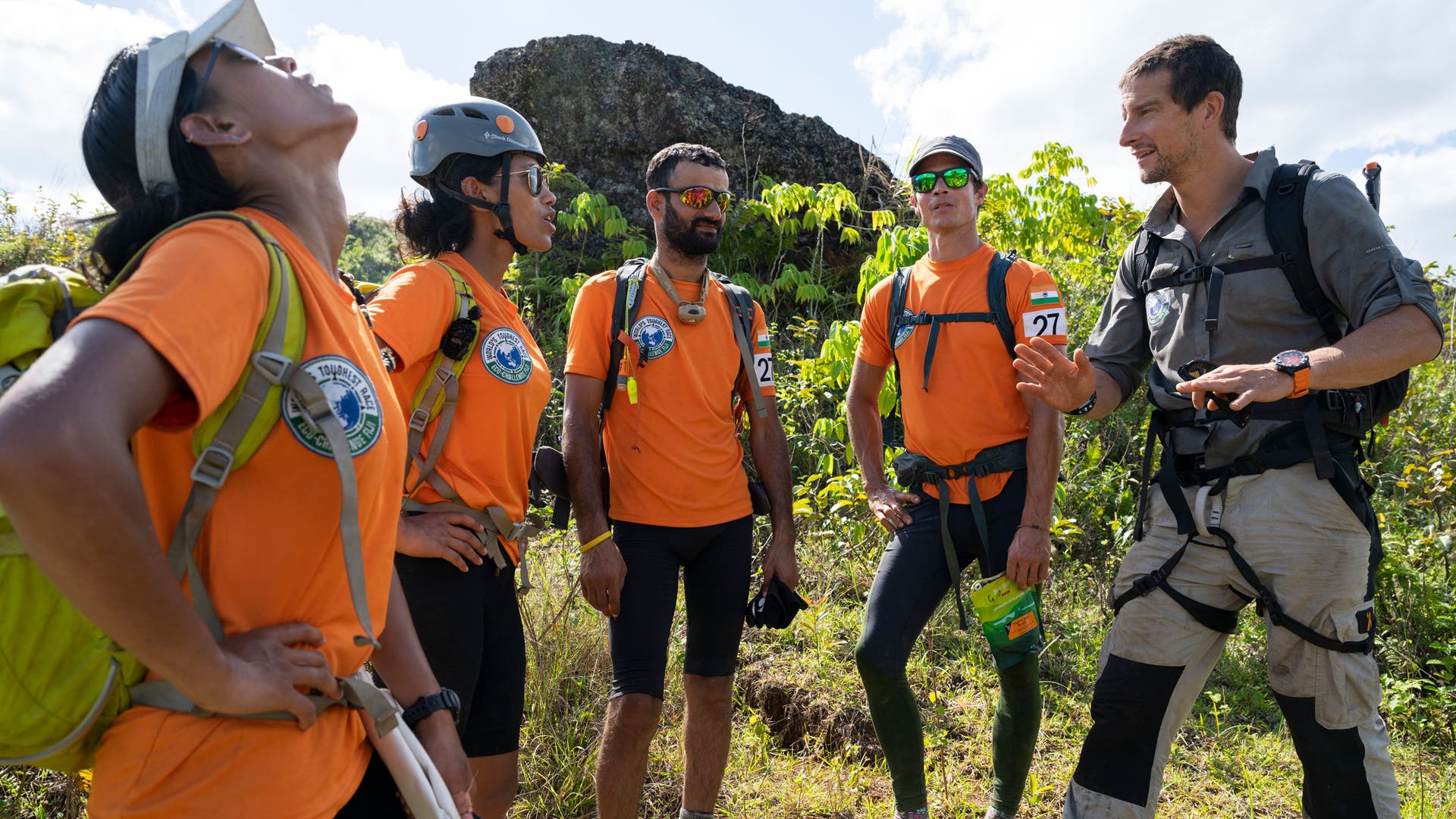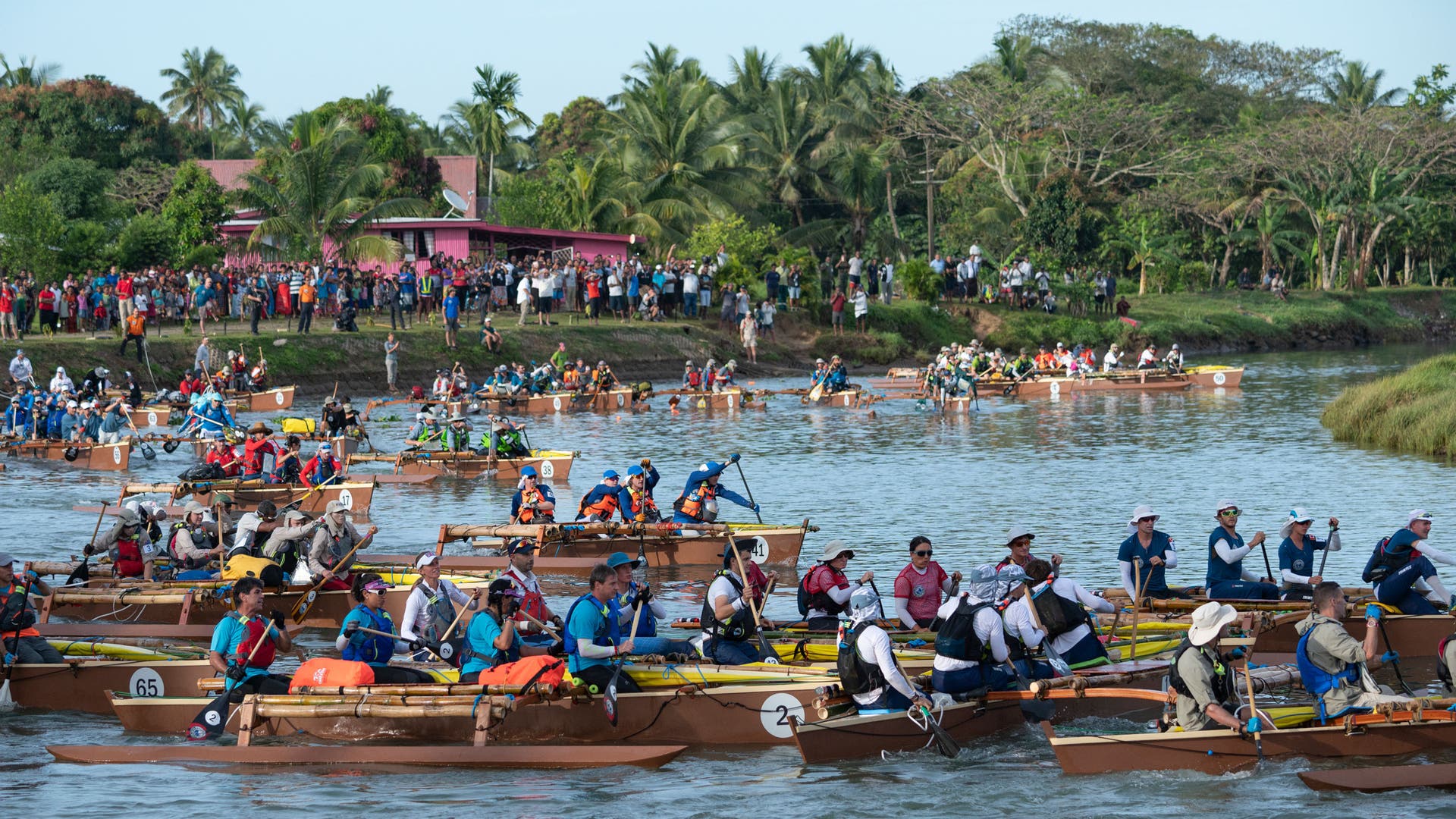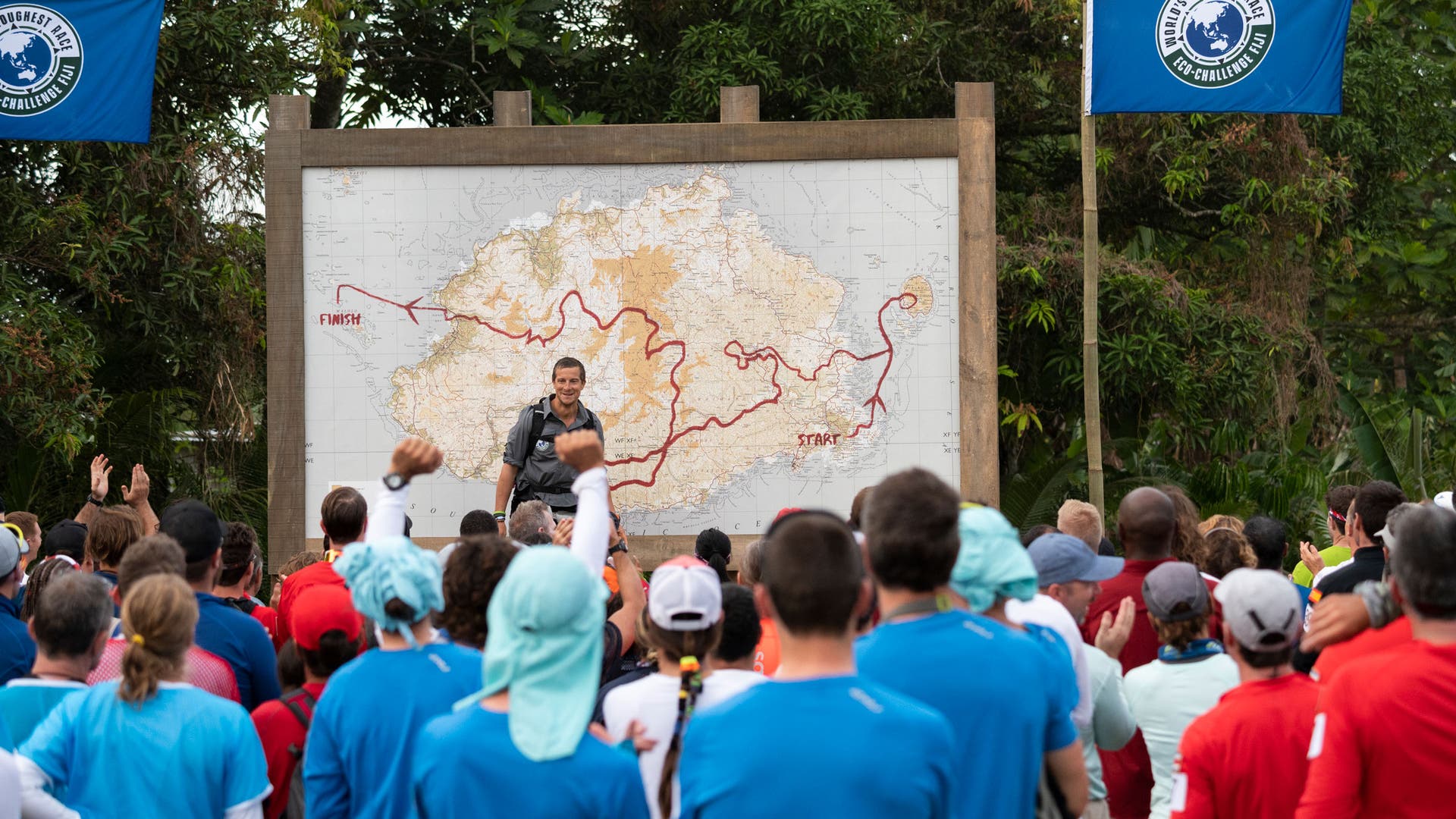Triathletes Take On Eco-Challenge

Before I ever met my pro adventure race teammate and friend, Monique Merrill, I heard a rather harrowing story about how she had terrorized my triathlete friend, Chris Legh, during a stage race in Malaysia. Early in the race Legh got a concussion when he hit his head against a low branch in the jungle and spent much of that day puking. His teammate, Merrell, was not pleased with the turn of events and harangued him, yelling as he fed the fish during a paddle section of the race, “I knew this would happen if we invited a &^$%#! triathlete to race with our team!”
Adventure racers, as Swiss-Army-Knife-type athletes, often cop a ‘tude when straight-forward three-sport-sorts are concerned, but now that many are transitioning smoothly from swim, bike, run to anything goes, they, like Merrill, have learned that a good engine, great attitude, and incredible work ethic are superb attributes for a teammate.
After a 17-year gap, “The World’s Toughest Race: Eco-Challenge” has returned, bringing more than 60 teams of four from around the world to Fiji for an expedition adventure race that will be aired on Amazon Prime Video as a 10-episode series, hosted by Bear Grylls. As you may recall from the previous eight Eco-Challenges, from 1995-2002, teams race non-stop, navigating together on foot, mountain bike, raft, paddle board, outrigger, canyoneering, rappelling, and climbing to cover more than 417 miles of challenge terrain and sea.
We caught up with Josiah Middaugh, of XTERRA fame, who raced on “Team Out There,” and the four teammates and their support person from “Team Iron Cowboy.”

Coming from a triathlon background, was it a shock to your system to deviate from constant forward motion in a relatively controlled environment that happens during daylight with three straightforward–literally–disciplines?
Josiah Middaugh: “Fiji has roughly 12 hours of daylight and 12 hours of night, so racing through the dark was definitely an adjustment. I don’t consider myself a conventional triathlete with my off-road focus and many multi-sport competitions under my belt, so traveling over and through rugged terrain was not a problem. [Note: Middaugh is a 10-time GoPro Mountain Games Ultimate mountain challenge champion, 10-time Mt. Taylor quadrathlon champion, won the Red Bull Defiance, and took second at La Ruta de los Conquistadores. His previous adventure racing experience was in stage races in China, France, and New Zealand, with competitions spread out over several days, but primarily during daylight hours and proper sleep at night.] Expedition racing is another level of adventure racing.”
Shaun Christian: “I was actually excited and welcomed the change. We went into this race very prepared. We had a good knowledge of what was coming, and like all seasoned triathletes, we obsessed about getting it right. The one discipline that I was most worried about was sailing and the ocean outrigger.”
James Lawrence, aka the “Iron Cowboy” who is known for completing 50 full-distance triathlons in 50 consecutive days, in 50 states: “To be honest, the whole thing was foreign to me. I had never done much rock climbing, river rafting, navigation, and everything else they tried to throw at us. It was a very welcome challenge.”
Sonja Wieck (team captain): “If it was a shock to the system, it was in the best way possible. Some triathletes stick to home and a regimented schedule when they are training really hard, but I always enjoyed more of an adventure racer attitude when it came to my big Ironman training blocks. I would often travel to adventurous places, meet up with other like-minded triathletes, and enjoyed executing a focused block of training with more of an adventurous style, that would involve multiple daily sessions. Training for World’s Toughest Race, Eco Challenge Fiji reminded me more of what I loved about triathlon training and how bringing in adventure helped keep it fresh and fruity for me.
“In terms of racing though, the two are very different, and that is a shock to the triathletes’ system in a big way. We rip ourselves apart out on the courses we race in triathlon, but with adventure racing, you have nine more days on the feet you just shredded, so you have to change your mindset from the beginning. In triathlon you are trying to dole out maximum sustainable energy with minimal mistakes, in adventure racing you are trying to dole out minimal sustainable energy while problem solving maximal mistakes.”

What was the most difficult aspect of the race for you?
Middaugh: “Sleep deprivation was new to me, although I am a father of three. It was unknown how I would respond to over a week or racing with very limited sleep. Going into the race, our New Zealand teammates said that two hours per night is ok for the first five days, but beyond that they felt three hours per night might work better. That was hard to wrap my mind around. I would have liked more experience in that area, but I decided it was not something I should train for. I embraced the new challenges and went into it with the mindset that I would be uncomfortable in a completely different way than triathlon racing. The length of the race, roughly 417 miles of non-stop racing over the most challenging terrain was very daunting, so I was most worried about injury, infection, or illness. The logistics of the race were also very complex. I think as triathletes we experience a little of that, but multiply the logistics of a long distance triathlon race by 10. The planning of gear and logistics was a six-month process for our team.”
Lawrence: “I would have to say the unknown aspect of everything. The race is very secretive and elusive. We didn’t know which activities would be done, in what order and for how long. Fueling was difficult to prep for. It is tough to prepare appropriately for something you have limited information about.”
Wieck: “The most difficult aspect for me was the responsibility of being the sole navigator over the entire race. It was a heavy weight for me, being that it was my first adventure race, so my first time dealing with maps that I hadn’t prepared myself. I usually take hours to study and thoroughly understand a map set, but in the World’s Toughest Race I got my new map set for each leg of the race when I was the most tired, and I had limited time to understand it and keep us on track. I was in a foreign country that I didn’t have a sense of the terrain (spoiler, it’s gorgeous and beautiful, and hard, and challenging all at once) until we got into the race, and I had three guys with me that I really wanted to do right by, keeping us found and not lost. I wanted to be a team player, but I also had the navigation responsibility on top of that, and managing my own emotional state with that responsibility over many many days and sleep deprivation, and extreme fatigue, was my biggest challenge.
“There was a time in the race where I was repeating ‘I don’t want to get lost’ and the guys were saying in unison ‘we don’t care if we get lost’ and then I would repeat ‘but I don’t want to get us lost’ and they would say ‘we don’t care if you get us lost.’ (Repeated many times.) They had so much more faith in me than I had in myself many times over, and that was a hard aspect to face out there.”

Was it a challenge to be part of a team instead of just relying on yourself, as you are used to doing as a triathlete? What aspects were welcome? What aspects not?
Middaugh: “Most of my training is done solo, so the team dynamic is definitely challenging. Luckily our team members tended to bring out the best in each other and not the worst. The goal in adventure racing is to be faster than your weakest link and that is only accomplished with teamwork and positive attitudes. It is easy to get frustrated when mistakes are made or when teammates are going through low points, but you need to have compassion and think of what is best for the team. You also need a big dose of humility because it might be you relying on your teammates to get you through some low points.”
Christian: “I loved the team aspect of the race. It can get lonely training and racing alone and in your own head. It was nice to be able to rely on teammates for support, and to be able to give that support back. I do think we all have a bit of that type A personality and, at times, that made it difficult to agree on particular decisions. We did have a race plan set in place; that our navigator had the final say in the direction we travel. We did have a couple conflicts out on the course but nothing that cost us too much time.”
Lawrence: “I always say that nothing great is ever accomplished on our own. This includes triathlon. With that said, I found having to rely on someone else very frustrating. I know how to push through, control my mind. Having to worry and help others through this was unexpected and challenging. I learned a lot about others on my team. I choose sports like wrestling, golf, and triathlon because if I win or lose, it’s my fault. I didn’t enjoy giving up some of that control. Knowing that my failure was dependent on another’s will to continue was tough on me.”
Wieck: “I really enjoyed the team aspect of racing together, compared to how things are done in triathlon. Through the pre-race process having a team to rely on for decision making, training, and problem solving was such a welcome perk. We were lucky in that James (Lawrence) was the common thread between all of us and he understood each of us the best. So he acted as the main emotional leader and motivator, whether he liked it or not. His strength in that area really helped our team perform when things got tough. The downside to the team element for me was that when I wasn’t my best I had three guys to witness the tears and meltdowns. I’m a very emotional person, I wear my heart on my sleeve, and racing this hard for this long is an emotionally trying endeavor. I felt crazy at times, and of course we never want anyone to witness our crazy.
“During the final leg of our race, I can’t give anything away, but I had a chance to look at the three guys in front of me, working VERY HARD as we raced towards the end of our journey and I was overcome with pride. Not only are the guys amazing athletes, but they all have strong hearts, full of compassion and a true spirit of tenacity. I will love them for life after this experience, and that is worth any of the hard parts of the team aspect.”
Joe Morton (crew): “To me it was not difficult to be part of this team. It boosted and inspired me. They are not only world class athletes but very fun. Their high-end endurance training prepared them so well. They would come into camp in great moods. Their enthusiasm and energy was so fun to observe. It was inspiring to see how their Ironman and endurance training had prepared them to do so well.”
How did your triathlon background help you? Was it ever a hindrance? What skills did you feel you lacked or, if you could go back, how would you modify your training?
Middaugh: “The years and decades of consistent training and race experiences gives you the mindset and physical ability to excel at adventure racing, but it is very different. Triathlon training/racing is more about speed, efficiency, and relatively high intensity, whereas adventure racing is about enduring, being comfortable being uncomfortable, and also involves some real skills. Unlike obstacle course racing, the Eco-Challenge in Fiji required real outdoor adventure skills such as navigation, class 4 white water, ocean paddling/sailing, climbing fixed ropes and rappelling. It is very difficult to be 100% prepared for the demands of adventure racing because of the number of disciplines and the duration. Roughly 40% of the race in Fiji was on the water so I could have used more specific paddling training time. Also, you are always carrying a pack with mandatory gear, food, and water so you need to train to carry a 20-30 lb pack for days. Every stage is different so you might be carrying climbing gear, paddling gear, or biking gear even while trekking. If you are lucky you might also be carrying the team’s medical kit and machete.”
Christian: “Obviously the fitness of being long course triathletes played into our favor. We were fit and prepared physically. I also feel that our four training camps leading into this race prepared us for what we saw in Fiji. I do believe our lack of adventure racing experience made us extra cautious, and the Utah boys were for sure inexperienced paddlers and sailors… and there was a lot of water! We had all watched the previous Eco Challenge races and saw that very few people finished. So, our main goal going into the Eco Challenge was crossing the finish line. We may have played it too safe.”
Lawrence: “Our team was strong on the bike sections of the race. We were comfortable on our bikes; it was familiar. Everything else was a hindrance to me. I was like a fish out of water. The 1,000 foot ascent up a waterfall at night definitely intimidated me. I feel we did everything we could, given the timeframe, to train. I would prepare and execute very differently, knowing the nuances of the race, given a chance to race a second time.”
Wieck: “All four of us are endurance athletes in our heart, we all like to go long, whether it’s swim, bike, or run. Triathlon taught us how to train hard in multiple disciplines and how to rack up miles. We all coach other endurance athletes, so we are familiar with how to build fitness, and that was really helpful in this setting. You can’t race across the entirety of Fiji without some deep fitness. What we were lacking was all the technical skills; rafting, climbing, paddle boarding, outrigger, you name it! We didn’t have many of those skills when we got accepted into the race, but we started immediately gaining the skills we needed and we asked for lots of help. I think having a multisport background helped because we all had strong muscle mechanics in multiple areas. Paddling is like swimming, so it was more about skills and techniques than it was about gaining fitness.
“If I could go back, I would have lived on my mountain bike. I was brand new to mountain biking and I cried on 50% of my training rides. That is not a joke, I totaled it up. I find the scary stuff really scary, and I cry when I can’t ride up something or I feel out of control. Learning to mountain bike was a big push for me coming from a pure cycling background. I knew Fiji would be scary for me on the bike, but in reality, the terrain is so beautiful and some of our rides in the race were so epic that my highest highs and lowest lows all came on the mountain bike.
“I will add that I had a background in backpacking, climbing, and rafting before I got into triathlons. So while I was rusty, it came back quickly, and that was a super helpful asset for our team. In adventure racing you have to have a navigator (two navigators are preferred) and we got lucky that I had that background before triathlon. That’s the one area where I think pure triathletes would be at a severe disadvantage. Someone needs to master the map and compass, and while I’m not a master, I didn’t have to fully develop that skill in six months (and don’t think that would have even been possible).”
Do you foresee that Eco-Challenge and adventure racing, as with swimrun, ultrarunning, and multisport events that fall outside the “traditional mass participation” races will gain momentum in the post-pandemic world? If so, why and any specifics of how you envision that taking hold?
Middaugh: “I do. This could be the perfect time for a resurgence of adventure racing. People are looking for epic challenges that are authentic, even before the pandemic hit. The void adventure racing left when Eco Challenge exited in the early 2000s was replaced by ultra running, obstacle course racing, and now swim-run and gravel racing. Now with more people venturing off the pavement there is a larger pool of adventure-seeking athletes that would really enjoy this format of racing.”
Christian: “I think they should grow in popularity. I love the sport of triathlon and always will, but you can get burned out or reach a plateau. When James (Lawrence) told me about this race I got super excited and asked him ‘If anyone can’t go, I’m your guy.’ I got a call one day from James asking me if I was serious when I said that. I reassured him I was. The rest is history. I was in a place in my life where I was too comfortable. I was still training for triathlons but it had gotten mundane and routine. I need to get pushed outside my comfort zone and this was just the opportunity I needed to help me grow. I do see a change coming. I changed the name of my triathlon store from T3 Triathlon to T3 Endurance Sports. I see it as looking outside the box and into an endurance sports where the sky is the limit on how it is presented in a race format. People are wanting new and exciting ways to race and test their endurance/fitness skills.”
Lawrence: “I think after this airs on Amazon Prime there will be no shortage of applicants. Athletes are going to want to take a crack at this. I love seeing the sport evolve into other categories. I just raced the Ötillö swimrun race on Catalina Island and loved it.”
Wieck: “Absolutely! Social distancing is much easier in some of these developing sports where it’s less about the maximum number of participants that can fit on a course and more about moving across the earth in a sustainable and sensitive way. Adventure racing and Ötillö (I’ve done both now) are so much more about your relationship with the beauty and challenge the actual Earth can offer you. You “get” to do it with a team and so that perspective is a shared experience which I think is more healthy for the competitors as well. As triathletes shift over to these different sorts of races I hope it allows them to shift away from this trend of ‘constant achievement,’ where it’s so much about podiums and ego, over to a place of internal confidence and a positive relationship with terra firma and their best friends.
“In order for a shift to take hold, we need to get some map and compass skills going! Or I could see a format of adventure racing where the map and compass isn’t quite as necessary by using signage to help teams through tricky sections. This would be a great way for triathletes to test out adventure racing without having to take on the daunting task of learning map and compass. I think there is space for more extended multisport racing over crazy courses that are marked. That would make the event more about fitness, which triathletes are used to, and less about not getting lost. I could see a space for that type of race. Think Ötillö-style that brings in more sports.”
Any advice to triathletes thinking of adventure racing?
Middaugh: “Acquire the specific skills for adventure racing, on the water, ropes, mountain biking, and navigation. Also you need to really get into the backcountry and carry heavy stuff. As an XTERRA athlete I am off-road for a lot of my training, but that is different than being off the trail. I realized that most of my training is actually in the front country on designated mountain bike trails and running trails. I really enjoyed getting off the trail and trekking/running through Colorado’s high country as part of my preparation.”
Wieck: “World’s Toughest Race taught me that we need to be thinking more sustainably about the impacts of our racing on the environments and communities we pass through. Rather than thinking of races/courses as this nebulous place that is created for us to run all over in hopes of a PR, there is a way to honor and care for the environment and people as we are passing through. I think of the communities that are impacted and the reputation triathletes have of swooping in destructively, then gone by Monday morning, with the community left feeling the effects of the triathlon-hurricane. There is so much room for a better relationship between racers, communities, and the environments we impact. We have gotten out of touch with humanity through triathlon racing, and there is so much room to grow here in a way that will emotionally benefit the racers as well.”
Morton: “Get a good team. Start out with a small event like 1-2 days. Also, work on your mountain-biking skills.”
Anything else you’d like to add for Triathlete readers?
Middaugh: “If you need a manicured course, aid stations, a shower and warm bed to sleep in, adventure racing is not for you. Our feet were wet nearly 100% of the time and some of our trekking was so rugged we were literally going 1 mph upstream on slippery rocks, in the mud, or in the water, through the rain at night. There is a certain amount of nimbleness required to move quickly and your threshold for pain and suffering needs to be high. If you are looking for a truly epic challenge, this is it.”
Lawrence: “This isn’t a triathlon. This is, however, an awesome adventure you’ll never forget. I would advise any and all to look into races outside the traditional format of swim/bike/run.”
Morton: “I have found that so much of a triathlon preparation is focused on training and logistics. Oftentimes we forget to enjoy the journey. So much happens to us as we train for and compete in a triathlon. Take time to be grateful for what you are experiencing. How blessed you are to have a body that can do what you are doing. Your body is a miracle. Gratitude is magical. Also, be patient with your body. There are a lot of muscles, fibers and tendons that need to be built along the way. And don’t forget about your mind. Mindset is huge in triathlon. Work on your mind.”